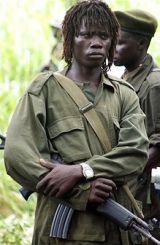Uganda agrees to conditional ruce with LRA rebels
Aug 25, 2006 (KAMPALA) — The Ugandan government and Lord’s Resistance Army rebels agreed Saturday to a truce to end a brutal 19-year conflict that left thousands dead, officials said.
 The agreement – which goes into effect at 0600 GMT Tuesday – was reached during peace talks held in Juba, southern Sudan. It calls for both sides to end all military action in one of Africa’s longest wars.
The agreement – which goes into effect at 0600 GMT Tuesday – was reached during peace talks held in Juba, southern Sudan. It calls for both sides to end all military action in one of Africa’s longest wars.
“We have agreed on the issues and put our signatures on the document,” government spokesman Paddy Ankunda said by telephone from Juba.
“We are happy, and now we will continue working for a comprehensive peace agreement,” Ankunda said. Meanwhile, the Ugandan army will continue operations until the cessation deadline, he said.
Rebel negotiators could not immediately be reached for comment Saturday.
After the cease-fire announcement, the rebels will have three weeks to gather at two assembly points in southern Sudan where they can be monitored by southern Sudanese forces, and will be given food and safe passage, government officials said.
The agreement was signed in Juba on Saturday by Martin Ojul, head of the Lord’s Resistance Army delegation, and Uganda’s Interior Affairs Minister Ruhakana Rugunda. South Sudan’s Vice-President and chief mediator Riek Machar also signed the document.
The government earlier refused to consider a cessation of hostilities, citing abuse of previous cease-fires by the rebels, but on Friday decided to issue three conditions in exchange for a truce.
The Lord’s Resistance Army delegation spent a day studying them before signing the deal. The rebels now must inform their soldiers scattered throughout northern Uganda, and the two sides still must agree on safe assembly points.
The Lord’s Resistance Army already has declared a cease-fire, but several of its fighters have been killed in recent weeks by Ugandan forces. Estimates for the number of Lord’s Resistance Army fighters vary between 500 and 5,000.
Talks between the two foes began in Juba in July, but disagreements over whether to declare a cease-fire first and then negotiate a comprehensive agreement led to delays and temporary walkouts by both sides.
The government of Sudan’s autonomous southern region is mediating the peace process.
South Sudan’s president, Salva Kiir, held talks with Ugandan President Yoweri Museveni. In a joint news conference after the closed-door meeting, Kiir said that should the peace process fail, both Ugandan and south Sudanese forces would fight the rebels.
Under the terms of the peace talks, a cessation of hostilities involves an end to fighting and propaganda. A full fledged cease-fire will involve more technical issues such as demobilization, disarmament and reintegration of troops.
Thousands of civilians have died in the conflict and 1.7 million have fled their homes, according to relief organizations.
The Lord’s Resistance Army is made up of the remnants of a rebellion that began after President Museveni took power in 1986. The group is known for abducting thousands of children and forcing them to become fighters, servants or sex slaves.
During last month’s negotiations, rebel representatives said their group’s aim is to draw attention to the government’s neglect of northern and eastern Uganda, even though they previously had no clear political agenda.
In the past, Kony has called for Uganda to be governed according to the Bible’s Ten Commandments.
The Lord’s Resistance Army does not hold any Ugandan territory.
(AP/ST)
